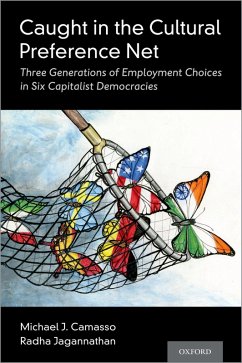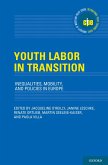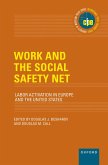How big of a role have national cultures--the collection of values, beliefs, attitudes and preferences--played in the formation of social and economic identities? If substantial, can these identities impact work related attitudes and impact personal decision as specific as the preferred type of job or even the choice of seeking employment at all? At a time when Millennials and Generation Z'ers are facing prodigious employment challenges, it is more timely than ever to examine the ways culture, especially cultural transmission from older to younger generations facilitate (hinder) influence labor force attachment and even the work ethic itself. Caught in the Cultural Preference Net examines work-related beliefs, attitudes and preferences that characterize the value orientations of three generational families in Germany, Sweden, Spain, Italy, India and the United States. These six countries have developed significantly different forms of capitalism ranging from the social democratic form in Sweden to the relatively unfettered, free market capitalism in the United States. Michael J. Camasso and Radha Jagannathan investigate whether these cultural and economic contexts have resulted in enduring attitude and preference structures or if these values and preferences have been changing as economic conditions in a nation have changed. These two experts focus a great deal of their attention on the roles that parents and grandparents have in socializing Millennials into the world of work and if this influence trumps the often competing influences of education, labor market and peers. The book is organized around three lines of inquiry: (1) Do some national cultures possess value orientations that are more successful than others in promoting economic opportunity? (2) Does the transmission of these value orientations demonstrate a persistence irrespective of economic conditions or are they simply the results of these conditions? (3) If a nation's value orientation does indeed impact economic opportunity, does it do so by influencing an individual's preferences? To answer this third question, Camasso and Jagannathan conduct a cross-national, multi-generational stated preference experiment--one of the very few ever attempted. The resulting book reveals substantial cultural stability across generations in some of the six capitalist democracies and substantial intergenerational change in others. The implications of this differential impact for national employment strategies are explored as are the implications for a global economy distinguished by abundant, well-paying service jobs for youth.
Dieser Download kann aus rechtlichen Gründen nur mit Rechnungsadresse in A, B, BG, CY, CZ, D, DK, EW, E, FIN, F, GR, HR, H, IRL, I, LT, L, LR, M, NL, PL, P, R, S, SLO, SK ausgeliefert werden.









